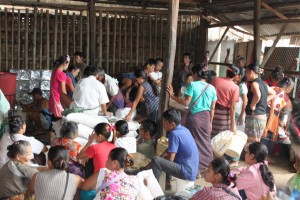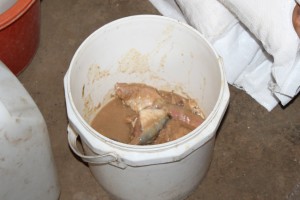Members of the European Burma Network are deeply concerned that refugees from Burma living in camps in Thailand are being pressured to return to Burma prematurely because of cuts in aid.
The international community, and in particular the European Union, is pursuing policies which could in effect force refugees from Burma back into the country before it is safe for them to return, and without the support they will need.
Reforms in Burma, including the peace process, have not progressed to a degree where it is safe for refugees to return. Even where ceasefires have been signed, full codes of conduct for the ceasefires have not been agreed. The Burmese Army is increasing, rather than decreasing, its presence in ethnic states. Human rights violations by the Burmese Army and associated forces, although reduced in some areas, are still taking place. Political dialogue which could lead to a lasting peace has still not begun, and there is little prospect of genuine dialogue starting in the foreseeable future.
Despite these serious problems, many donors have used the reforms in Burma as justification for reducing funding for refugees, despite the fact that the number of refugees has not significantly fallen. This is resulting in cuts in rations, shelter, clothing and other essential services.

In some instances funding has been diverted towards livelihood programmes designed to help refugees when they return to Burma. However, these programmes are so underfunded they do not come close to providing adequate programmes. It is also wrong for funding to be diverted from providing essentials such as food and shelter. Funding for these programmes should be additional to, rather than instead of, providing essentials for survival.
Facing reduced rations and other support, many refugees feel that the international community is trying to force them back to Burma against their will, Refugees have even questioned if the cuts are designed to ‘starve us back to Burma’.
By using cuts in aid to try to force refugees back to Burma, donors such as the European Union are putting refugees at risk of being subject to human rights abuses, landmines, and living in extreme poverty.
Members of the European Burma Network call on the European Union and other donors to reverse cuts in funding for food, shelter and other essential aid for refugees and internally displaced persons in Burma.
We call upon all donors to recognise that reforms in Burma have not yet created a situation where it would be safe for refugees to return to Burma.
Refugees consulted by members of the European Burma Network have expressed a desire for action in the following areas to enable them to be able to consider returning to Burma.
Refugees are calling for troop withdrawal. Since ceasefires have been signed there has been increased militarisation, with significant increases in Burmese Army soldiers in ethnic states. Refugees do not feel that it is safe to return to their homes and villages while they are occupied by the Burmese Army responsible for committing war crimes and crimes against humanity against them. This is not an issue being prioritised by the international community despite their proclaimed support for the peace process.
Refugees express concern about landmines in their old villages and farms. Although some limited landmine clearance has taken place, it is very small scale compared to the need.
Refugees also want their land back. Many report that their land and even homes have been confiscated by the Army or Government. No efforts are being made to address this issue, and in fact, since reforms began, this problem has got worse.
Refugees need much more than livelihood programmes to assist their return. Most refugees have lost everything they owned. Their homes have been destroyed, their property and livestock looted or destroyed. They need assistance to rebuild homes, replace tools, seeds and livestock. They want compensation from the Burmese government for property lost or stolen. No efforts are being made to address this issue.
Many refugees want to return to their home villages, not be forced into special economic zones as the Burmese government proposes. They don’t want to be cheap labour in factories. No significant pressure is being applied on the government of Burma to ensure it allows refugees to choose where they want to live.
Refugees also stressed the need for justice and accountability. They want those who committed the abuses, who were responsible for what happened, to be held accountable. They say they don’t want revenge, only justice. No action is being taken in this regard within Burma. The government of Burma does not even accept widespread human rights abuses have taken place. The international community, including the European Union, is not taking any action relating to past or present violations of international law.
The European Union and its members largely approach the peace process by supporting Burmese government mechanisms and from the perspective of the Burmese government. Little support or attention is given to armed ethnic political groups, and almost no attention is paid to community based organisations and victims of human rights abuses by the Burmese Army and government. Peace and safe refugee return will not happen without the involvement of the communities affected. Their voices must be heard, and their concerns acted upon.
Members of the European Burma Network call upon the European Union and its members to start to listen to and address the concerns of conflict affected communities in and from Burma, as outlined in this statement.
Signed by
Actions Birmanie – Belgium
Austrian Burma Center
Association Suisse Birmanie
Building Social Democracy in Burma – A project under ASD Sweden
Burma Action Ireland
Burma Aktion (Germany)
Burma Campaign UK
Burmese Rohingya Organisation UK
Christian Solidarity Worldwide
European Karen Network
Info Birmanie
Norwegian Burma Committee
Polish Burma Solidarity
Society for Threatened Peoples – Germany
Swedish Burma Committee
Swedish Social Democratic Students´ Burma Project

